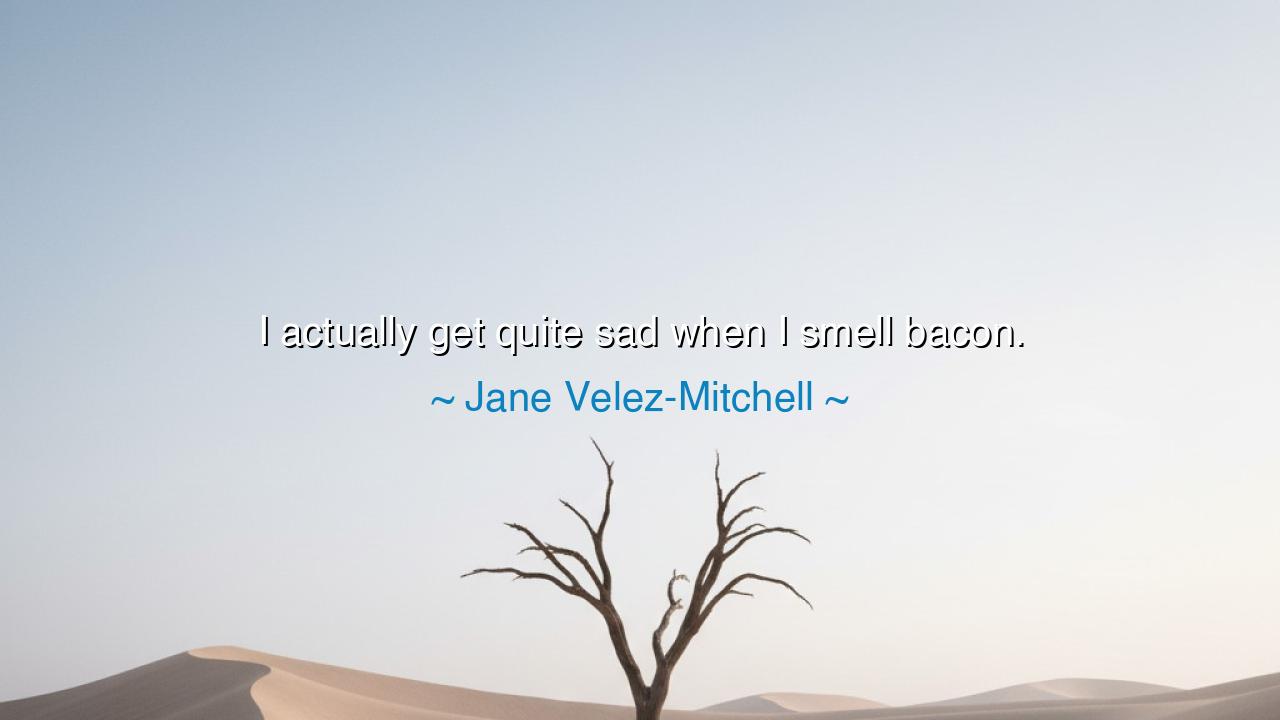
I actually get quite sad when I smell bacon.






Jane Velez-Mitchell, a voice both passionate and unyielding in her advocacy, once declared: “I actually get quite sad when I smell bacon.” At first, these words may seem curious, even lighthearted. Yet behind them lies a profound meditation on compassion, memory, and the moral weight of daily choices. For to her, the smell of bacon is not merely an aroma of indulgence—it is the reminder of a life lost, of a creature once living and breathing, now reduced to food. Her sadness springs from empathy, from the heart that refuses to sever pleasure from its cost.
The origin of this feeling lies in her lifelong commitment to animal rights and plant-based living. Having turned away from eating animals, Velez-Mitchell could no longer experience the scent of cooked meat with the innocence of one who sees only flavor. What others regard as comfort, she regards as tragedy. The smell evokes the image of the pig, intelligent and social, sacrificed for human appetite. Thus, her sadness is not about the food itself, but about the unseen suffering it represents.
History, too, shows us the power of smell to stir the heart. Think of Ulysses, who, after long wanderings, wept when he smelled the smoke of Ithaca’s hearths, for it carried the weight of memory and homecoming. Or consider the trenches of World War I, where the stench of battle forever haunted the survivors, each odor recalling sorrow. Just as for them, a scent could unlock grief, so for Velez-Mitchell, the smell of bacon carries within it not joy but lament, a reminder of cruelty veiled beneath familiarity.
In a broader sense, her words teach us about the transformation of consciousness. There are moments when the world around us seems unchanged, yet our perception of it alters forever. What was once a delight becomes a wound. For the reformer, the prophet, or the awakened soul, common things take on tragic weight. The same scent that causes laughter at breakfast tables causes in her a welling of tears. This is the paradox of vision: to see deeply is to feel deeply, even when it brings sorrow.
The deeper meaning of her confession is that compassion can transform desire into grief. What most celebrate, she mourns, because her heart has widened to include the voiceless. Her sadness is, in truth, a sign of strength: the refusal to turn away, the willingness to carry the weight of awareness. Where others shield themselves in habit, she has chosen to face the truth, even when it wounds her. This is the noble burden of empathy, the price of a conscience unafraid to feel.
The lesson for us is clear: we must learn to see beyond appearances, to question the comforts we take for granted. Not all pleasures are innocent, and not all traditions are just. Whether it be in food, in fashion, or in any sphere of life, let us ask: what is the cost? Who suffers for our delight? And when we discover sorrow hidden beneath joy, let us not harden our hearts, but allow ourselves, like Velez-Mitchell, to feel the sadness that leads to compassion.
Practical wisdom follows: the next time you encounter something that brings you joy, pause to consider its deeper roots. If it is tainted by harm, seek a gentler alternative. Choose acts that align pleasure with compassion, that allow the heart to rejoice without sorrow. For the greatest delights are those that do not leave grief in their wake. And if you, too, feel sadness in the face of common customs, do not silence it—honor it, for it may be the voice of conscience guiding you toward higher living.
Thus Jane Velez-Mitchell’s words, though simple in form, bear a profound truth: “I actually get quite sad when I smell bacon.” They remind us that awareness can turn sweetness into sorrow, but that sorrow itself may be the seed of transformation. For in sadness lies empathy, and in empathy lies the hope of a more compassionate world.






AAdministratorAdministrator
Welcome, honored guests. Please leave a comment, we will respond soon